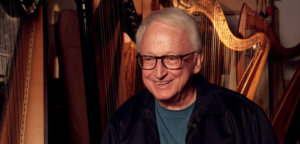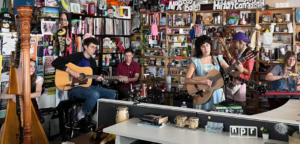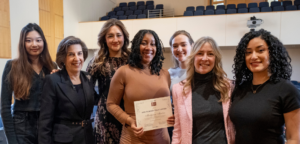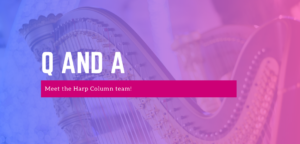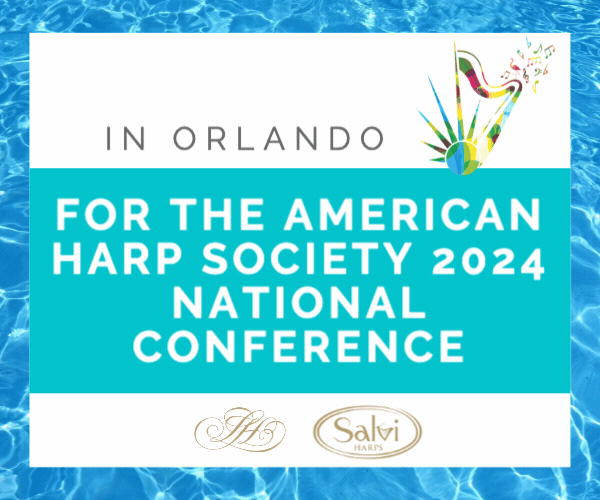Bach’s music has long inspired performers and scholars to revisit and adapt the Baroque master’s works for modern instruments, including the harp. From Henriette Renié and Marcel Grandjany in the 20th century to Laura Sherman and Catrin Finch in recent years, the harp community has long seen the value in exploring the music of this storied composer who lived long before the invention of the modern day concert harp. Harpist and organist Parker Ramsay is the latest musician to adapt Bach’s music for the harp, transcribing the epic Goldberg Variations for his debut album. With the first variation from the album being released today, we caught up with Ramsay to find out more about this monumental undertaking— an aria followed by a mere 30 variations.
Tell us about your decision to record the Goldberg Variations.
I guess the decision to make the recording came as a result not just of finishing up school, but a long time in school. I’ll explain: though my mother is a harpist and I took the harp pretty seriously in high school, I ended up pursuing organ and historical keyboards in college and first period of grad school. I was an organ scholar at King’s College, Cambridge while doing a bachelor’s in history, and then did a master’s in historical performance at Oberlin. That was great, but I had enough private teachers sit me down and tell me I ought to take a stab at the harp in school as well. Thus, two years at Juilliard followed studying with Nancy Allen. When all was said and done, I had large swathe of repertoire and experience, both in contemporary music and historical performance, so I was looking for a way to tie it all together. In the end I settled on the Goldbergs – (which) I had played on the piano in high school and on the harpsichord for my master’s recital at Oberlin, but in both cases was fiddling around with them on the harp for enjoyment. It struck me that taking them seriously as a transcription and recording project would be the ideal foray into synthesizing my training all at once.
You did the recording at King’s College, yes?
Indeed! I was very fortunate that King’s was receptive to the pitch for an album on their record label. When we thought about where we’d like to make the recording, the famous chapel at King’s seemed the most fitting, as it’s where I had spent many hours as an undergrad, accompanying services for the centuries-old Choir of men and boys. In addition, the acoustics of the room are simply incredible; there’s nothing that can beat stone floors and a fan-vaulted ceiling. Sound just doesn’t reverberate at King’s, it really floats and swims around.
The cover art is beautiful—tell us a little about that image.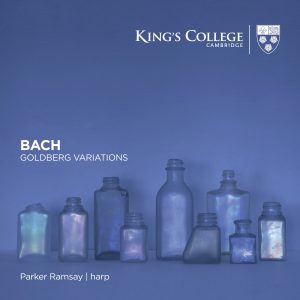
If my memory serves me correct that was a very quick decision. Ben Sheen, the producer of the album showed me a few images he liked and told he knew which one was his favorite but refused to tell me. As soon as I saw the bottles, it was obvious and he agreed. Each bottle on the cover is kind of like a variation in the Goldbergs – they broadly serve the same function, much in the same way that all the variations have roughly the same harmonic scheme. But each is slightly different in size and shape, making them individual.
Tell us about the recording and editing process—how long did it all take?
We made the recordings over five days last September, and the editing process wasn’t terribly strenuous. Again, Ben Sheen has an impeccable set of ears and allowed me to set some ground rules in the recording process. To be frank, I wanted a very clean album, free of as much finger and extraneous mechanism noise as possible. And Ben really took me seriously and held me to the standard. It was a daunting process, but as a result he was able to piece together takes that truly represented not just what I had to say about the Goldbergs, but how the harp sounded in the room.
Who was your audio engineer?
The label called upon Arne Akselberg from Abbey Road studios. I could not be luckier, as his experience as an engineer is unmatched. He’s engineered Grammy winning albums, and he also has a great deal of experience recording in King’s. And right around the time of the recording, the album of music he engineered for Aneeleen Lenaerts won a prestigious Opus Klassik Award. Again, I could not have been luckier.
With everyone in lockdown, and concerts shut down, how do you plan to release this album around the world? Are you planning a Zoom CD release party?
I’ll be on various webcasts and talks on social media, to try and raise awareness, as comes with the territory of CD promotion. I am lucky that a few live recitals have remained on the books, so with any luck I’ll be presenting the “Goldbergs” for the Charleston Bach Society in South Carolina on release day, and again for a series in New York the week after.
Parker Ramsay’s debut album, “Bach, Goldberg Variations” will be available for purchase and download on Sept. 18, 2020. Listen to a sneak peek above.









